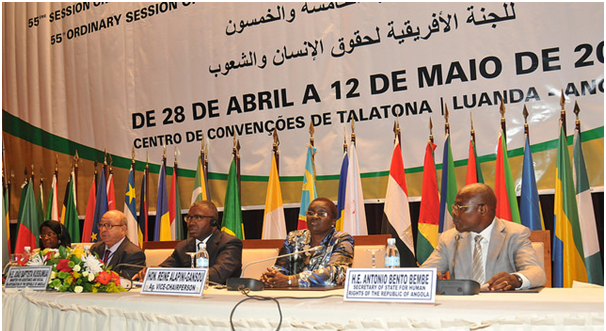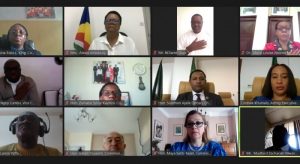
African Commission on Human and Peoples’ Rights


This is the primary institution responsible for promoting and protecting human rights in Africa through its oversight and interpretation of the African Charter. The African Commission consists of 11 Members (Commissioners) serving in their personal and independent capacity. The Commissioners are elected by the AU Summit (formerly the Assembly of Heads of State and Government of the OAU).
Article 45 of the African Charter spells out the African Commission’s mandateas follows:
The functions of the Commission shall be:
1. To promote Human and Peoples’ Rights; and in particular:
(a) to collect documents, undertake studies and research; on African problems in the field of human and peoples’ rights, organize seminars, symposia and conferences, disseminate information, encourage national and local institutions concerned with human and peoples’ rights, and should the case arise, give its views or make recommendations toGovernments;
(b) to formulate and lay down, principles and rules aimed at solving legal problems relating to human and peoples’ rights and fundamental freedoms upon which African Governments may base their legislations;
(c) co-operate with other African and international institutions concerned with the promotion and protection of human and peoples’ rights.
2. Ensure the protection of human and peoples’ rights under conditions laid down
by the present Charter.
3. Interpret all the provisions of the present Charter at the request of a State Party, an institution of the AU or an African organization recognized by the AU.
4. Perform any other tasks which may be entrusted to it by the Assembly of Heads of State and Government.
The African Commission holds two Ordinary Sessions of 21 days each year. During the Ordinary Session the African Commission considers, in public; state reports, applications for observer and affiliate status from NGOs and African National Human Rights Institutions and discussions of human rights situations in Africa. The African Commission also meets privately to consider human rights violations and adopts resolutions on human rights issues. During the inter-session period, the Members of the African Commission undertake investigative missions, and carry out various promotional activities.
Within its promotional mandate, the African Commission has appointed Special Rapporteurs, Working Groups and Focal Points to deal with specific thematic issues – namely:
Internal Mechanisms
These special mechanisms play a very significant role by researching, gathering and documenting information on these areas of human rights.
For more information, click here
FOUR MEMBERS JOIN AFRICAN COMMISSION ON HUMAN AND PEOPLES’ RIGHTS
 On June 29, during its virtual 28th Extraordinary Session, the African Commission on Human and Peoples’ Rights (ACHPR) swore in four new Commissioners who will begin six-year terms. They are: Marie Louise Abomo (Cameroon), Mudford Zachariah Mwandenga (Zambia), Ndiamé Gaye (Senegal), and Alexia Gertrude Amesbury (Seychelles). [ACHPR Press Release; ISHR] The Commissioners were appointed during the 33rd Ordinary Session of the Assembly of Heads of State and Government (the Assembly) of the African Union (AU), which took place from February 9 to 10, 2020, in Addis Ababa, Ethiopia. The gender balance of the ACHPR will remain the same, with six members who identify as female and five who identify as male. The new Commissioners join the continent’s human rights body at a time when some AU Member States are pushing back against human rights norms and regional oversight.
On June 29, during its virtual 28th Extraordinary Session, the African Commission on Human and Peoples’ Rights (ACHPR) swore in four new Commissioners who will begin six-year terms. They are: Marie Louise Abomo (Cameroon), Mudford Zachariah Mwandenga (Zambia), Ndiamé Gaye (Senegal), and Alexia Gertrude Amesbury (Seychelles). [ACHPR Press Release; ISHR] The Commissioners were appointed during the 33rd Ordinary Session of the Assembly of Heads of State and Government (the Assembly) of the African Union (AU), which took place from February 9 to 10, 2020, in Addis Ababa, Ethiopia. The gender balance of the ACHPR will remain the same, with six members who identify as female and five who identify as male. The new Commissioners join the continent’s human rights body at a time when some AU Member States are pushing back against human rights norms and regional oversight.
The new Commissioners will replace Soyata Maiga (Mali), Yeung Kam John Yeung Sik Yuen (Mauritius), Lucy Asuagbor (Cameroon), and Lawrence Murugu Mute (Kenya). Commissioner Asuagbor was first elected to a three-year term in 2009. Commissioners Maiga and Yeung were first elected to six-year terms in 2007. The Executive Council re-elected the three commissioners, and elected Commissioner Mute, to six-year terms in 2013. Commissioner Mute was among the 10 candidates presented to the AU Executive Council in December 2019, but was not reelected. The next expected elections will take place in 2021, when three Commissioners’ terms will expire.
The ACHPR has not yet published the new Commissioners’ biographies on its website; therefore, the information provided below reflects only what is publicly available.
Marie Louise Abomo (Cameroon) is a Supreme Court Judge and President of the Judicial Chamber of Cameroon. [JournalduCameroun]
Mudford Zachariah Mwandenga (Zambia) is Chairperson of the Human Rights Commission of Zambia. He was elected to Zambia’s Human Rights Commission in July 2016.
Ndiamé Gaye (Senegal) is a Magistrate and President of Chamber at the Court of Appeal of Thiès in Senegal. According to a 2012 CV available online, Commissioner Gaye previously represented Senegal before the ACHPR and the UN Human Rights Council. Commissioner Gaye is on Twitter.
Alexia Amesbury (Seychelles) is a politician and human rights lawyer. [Seychelles News Agency] She is the first person from Seychelles to ever serve on the Commission. She will fill what is referred to as the “floating seat.” See Decision 784(XXXIII) on the Appointment of Four Members of the African Commission on Human and Peoples’ Rights (ACHPR), Doc. EX.CL/1225(XXXVI) in Assembly of the African Union, Thirty-Third Ordinary Session: Decisions, Declarations, Resolution and Motion, p. 91.
Prior to the end of the ACHPR’s ongoing 28th Extraordinary Session, the new Commissioners will be assigned to “special mechanisms” or “subsidiary mechanisms” created by the Commission – such as working groups, committees, and special rapporteurships – under Rule 23 of the 2010 Rules of Procedure. See IJRC, ACHPR: Composition & Election Process. For example, outgoing Commissioner Lawrence Murugu Mute held the role of Special Rapporteur on Freedom of Expression and Access to Information and outgoing Commissioner Lucy Asuagbor held the role of Special Rapporteur on the Rights of Women; both will need to be replaced. See ACHPR, Current Commissioners.
In October 2019, the ACHPR elected Commissioner Solomon Ayele Dersso (Ethiopia) as Chairperson and Commissioner Rémy Ngoy Lumbu (Democratic Republic of Congo) as Vice Chairperson. [HRW] They will serve for two years as the Bureau of the Commission. See ACHPR, Final Communiqué of the 65th Ordinary Session of the African Commission on Human and Peoples’ Rights.
The Commission is composed of 11 Commissioners, who are elected in their individual capacity and do not represent any State. To ensure that Commissioners do not serve as representatives of their countries, civil servants and diplomatic representatives are excluded from serving on the Commission. See IJRC, ACHPR: Composition & Election Process. Commissioners serve on the ACHPR for six-year terms (although sometimes vacancies mean new members are initially appointed to shorter terms), and may be reelected. They serve on a part-time basis and are paid an allowance while in session. See id.
Rule 4 of the ACHPR’s 2010 Rules of Procedure and Article 31 of the African Charter on Human and Peoples’ Rights (African Charter) require that Commissioners are “of the highest reputation, known for their high morality, integrity, impartiality, and competence in matters of human and peoples’ rights.” While Rule 4 of the 2010 Rules of Procedure states that a preference should be given to individuals with prior legal experience, neither the 2010 Rules of Procedure nor the African Charter require that individuals have experience as lawyers or judges to be selected as Commissioners. See id.
The equitable geographic and gender representation is also considered when electing Commissioners. Pursuant to the 2016 Decision on the Modalities on Implementation of Criteria for Equitable Geographical and Gender Representation in the African Union Organs of the Executive Council (Doc. EX.CL/953 (XXVIII)) of the AU Assembly, there may only be two Commissioners from each of the African regions (East, Central, North, South, and West), and at least one of the Commissioners from each region should be female. The eleventh remaining seat is considered a “floating seat” and rotates by region. See id. Accordingly, during this election cycle, Commissioners were elected from the Central, Southern, and Western regions, and two are female. The “floating seat” was filled by a Commissioner from the Eastern African region.
The Executive Council of the AU elects Commissioners by secret ballot, and the AU Assembly confirms their appointment at its subsequent meeting. The four new Commissioners were elected during the 36th Ordinary Session of the Executive Council, held from February 6-7, 2020, and the Assembly decided on their appointment at its 33rd Ordinary Session, held from February 9-10, 2020.
For more information about ACHPR Elections, the African human rights system, or the African Commission on Human and Peoples’ Rights, visit IJRC’s Online Resource Hub. To stay up-to-date on international human rights news, visit IJRC’s News Room or subscribe to the IJRC Daily.